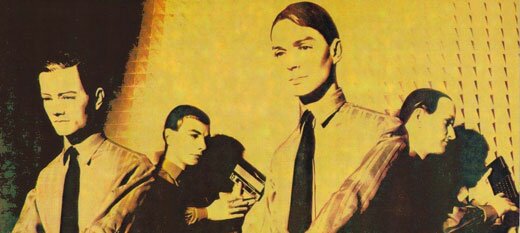Kraftwerkfeature
Posted by ben on 01 Mar 2007 at 11:01 am | Tagged as: essays, music

Following up on the Kraftwerk video I posted last week, I thought y’all might like a little background on what these guys were trying to accomplish. I find it interesting that critical writing about music most often emphasizes the formal and emotional aspects of the work, and generally disregards the philosophical implications. Visual art criticism, on the other hand, often focuses on the conceptual aspects of the work to the point that the discussion revolves around ideas that are tangential to the actual pieces. In any case, here’s an excerpt from a Lester Bangs interview with Kraftwerk from 1975 which gets to the heart of the Kraftwerk philosophy (read the whole thing on the Creem site):
They referred to their studio as their “laboratory,” and I wondered aloud if they didn’t encounter certain dangers in their experiments. What’s to stop the machines, I asked, from eventually taking over, or at least putting them out of work? “It’s like a car,” explained Florian. “You have the control, but it’s your decision how much you want to control it. If you let the wheel go, the car will drive somewhere, maybe off the road. We have done electronic accidents. And it is also possible to damage your mind. But this is the risk one takes. We have power. It just depends on what you do with it.”
I wondered if they could see some ramifications for what they could do with it. “Yes,” said Ralf, “it’s our music, we are manipulating the audience. That’s what it’s all about. When you play electronic music, you have the control of the imagination of the people in the room, and it can get to an extent where it’s almost physical.”
I mentioned the theories of William Burroughs, who says that you can start a riot with two tape recorders, and asked them if they could create a sound which would cause a riot, wreck the hall, would they like to do it? “I agree with Burroughs,” said Ralf. “We would not like to do that, but we are aware of it.”
“It would be very dangerous,” cautioned Florian. “It could be like a boomerang.”
“It would be great publicity,” I nudged.
“It could be the end,” said Florian, calm, unblinking. “A person doing experimental music must be responsible for the results of the experiments. They could be very dangerous emotionally.”
I told them that I considered their music rather anti-emotional, and Florian quietly and patiently explained that “‘emotion’ is a strange word. There is a cold emotion and other emotion, both equally valid. It’s not body emotion, it’s mental emotion. We like to ignore the audience while we play, and take all our concentration into the music. We are very much interested in origin of music, the source of music. The pure sound is something we would very much like to achieve.”
I am not a fucking film.